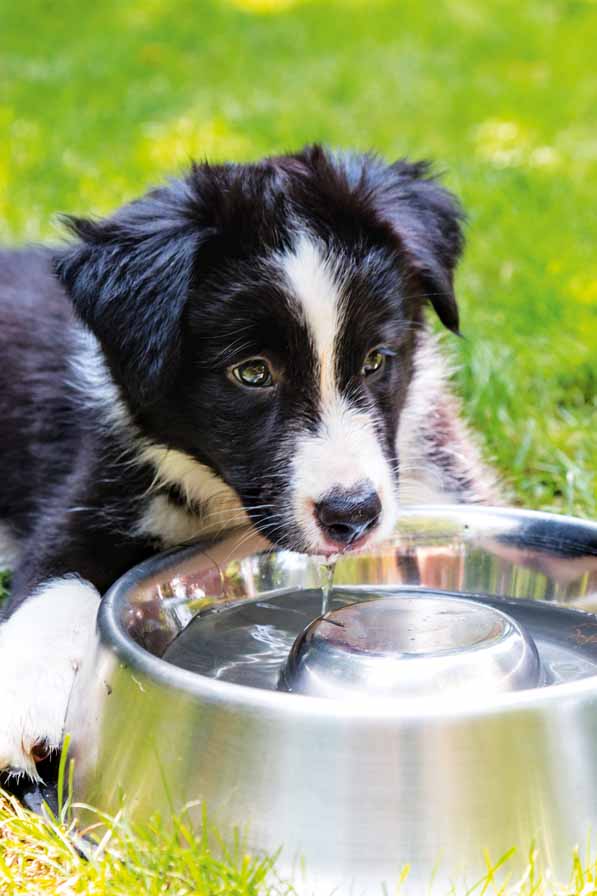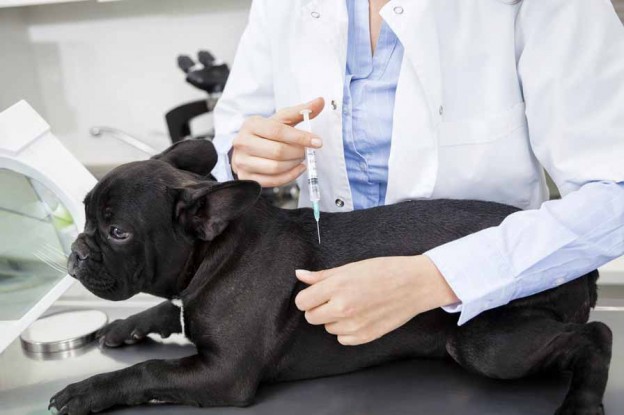Devoting time to training and following a correct diet and exercise plan helps to raise a well-adjusted and healthy pet. However, dogs and their owners do not always encounter the perfect world. Many owners find themselves faced with a dog suffering some form of stress or ill-health. Sue Moses discovers various natural therapies and training methods that will help in the stress management for dogs that will help your pooch relax.
Can you tell when your dog is stressed? Did you know that yawning and destructive chewing are both signs? Dogs will yawn when they are really scared, as this is doggy language to avert a conflict. And dogs stressed due to boredom are prone to chewing things up, as the action releases endorphins of good feeling in the brain.
Dogs suffer from stress, both emotional and physical, for many reasons. Loneliness, abandonment, lack of social contact, isolation and pain can all contribute. Symptoms can include aggression, sickness, barking, destructive behaviour and nervousness.
Gentle training methods
Dog trainer Sandra McLeod chose the holistic, gentle modern method of dog training using positive reinforcement after losing faith in what she describes as the jerk and pull training with a correction chain. She now runs the Happy Dog Training School in country Victoria with classes in Ballarat and Daylesford, where her gentle methods have won the hearts of many dog owners and transformed hundreds of unruly puppies and dogs to canine angels.
The four-week courses are held for puppies and dogs of various ages and levels. McLeod said a dog trained forcefully with a choker chain had no reason to come back to its owner once it was let off the lead as there was simply no good reason to hang around.
The dog associates training with pain, she said. With the gentle method, which includes using food rewards, an eight-week-old pup will learn to come when it is called in just minutes and does so because it wants to.
McLeod has become particularly well-known for a special course offered by her school the Re-shaping Course designed specifically for problem dogs. Most are dogs that have been re-housed. We see dogs that are difficult because they are understimulated and bored or anxious from being re-housed and previously mistreated, she said.
A Rhodesian Ridgeback called Chevy, brought to the Shaping class, had been so abused that its owner couldnt move his hands or feet without the dog fearing it would be hit or kicked.
Quick progress
Chevy’s owner Lea Hannah told Dogs Life the progress in just three sessions was remarkable.
Chevy was aged two when I got her and had, in fact, been trained but had been ruled with an iron fist and she was petrified, Hannah said. I couldnt pick up a toy or a ball without her ducking for cover. She was too frightened even to accept food rewards, but with the gentle method I was able to encourage her with my voice. Sandra (McLeod) taught me never to set her up to fail during the training, so there was never any reason for her to be in trouble. Now she is completely relaxed, she listens to every word and wants to please she is my constant shadow.
McLeod said as dogs are not verbal it is important for people to learn to read their body language.
Rewarding the dog when calm and being consistent are most important, she said. The whole family must be consistent with the training methods, right down to the words that are used. The result of this method is a dog that will come when called, walk at heel on a loose lead, is well-socialised and much more if the owner so desires, and the dog does it all because it is happy to do so.
Massage and flower essences
Canine Muscle Therapist Mal Lynch attended the National College of Traditional Medicine in Victoria after seeing it advertised in Dogs Life and then completed a 12-month course at the British College of Homeopathy. She now has a booming Melbourne-based mobile therapeutic massage business treating dogs suffering from physical and mental stress, as more and more people begin to appreciate the benefits of holistic methods.
Lynch told Dogs Life massage relieved physical stress by decreasing pain levels and toxins and freeing up joints and muscles. About 40 per cent of Lynch’s canine clients are treated for mental stress-related problems.
Client Tanya Drakopoulas, owner of a Border Collie-cross named Tyson, phoned Lynch desperate for help. Tyson was aggressive towards people and dogs despite having attended puppy school and further dog training classes.
Drakopoulas told Dogs Life she suspected that in the first few weeks of Tyson’s life he had lived in cramped conditions and received an inadequate diet. The result was muscular problems, including limited use of his hind legs.
Drakopoulas said gradually Tyson’s aggressive behaviour towards people and other dogs disappeared as he became pain-free. The massage has built his trust in people. He now associates massage with being patted and the problem with his hind legs has nearly disappeared, she said.
Lynch said when she first visited Tyson she had been confronted at the front door by an aggressive dog. Now he races to greet me and rolls over for a massage, she said.
Massage and the exercises and stretching involved are excellent for use prior to and post surgery and before stressful situations, she said.
Lynch uses massage, including Bowen, in conjunction with another natural therapy, Australian Bush Flower Essences. Lynch said the native herbs and flowers help bring about a sense of security, particularly for dogs who have been abandoned and who fear they may be abandoned again. She said she has achieved great results with the two methods combined when treating Pugs.
It calms the dogs and assists with the breathing difficulties Pugs often experience, something that also causes great anxiety for the owner, she said. This is an example where anxiety can be passed on from the person to the dog. The essences are particularly beneficial as they can be used on the dog and by the owner. Australian dogs and people react well to the Australian essences as they are already present in our environment.
Holistic veterinary care
Veterinarian Dr Michael Bascombe graduated from Murdoch University in Western Australia in 1984 and operated his own veterinary hospital. As time went by he became disenchanted with the limitations of Western medicine.
There were many times when tests and results would show there was nothing wrong with a dog, yet the owners would be telling me they felt there was something not quite right and I trusted them, but I had no answers, Bascombe told Dogs Life. And there was difficulty treating some simple yet common conditions such as skin problems.
Consequently, Bascombe began to explore complementary therapies in great detail and now purely practices holistic veterinary care from Blackwood, Victoria, to complement and, in many instances, replace the need for Western medicine treatments for the patients he treats most are dogs and horses.
He uses a variety of methods and techniques, including intuitive communication, Reiki, flower essences, kinergetics, theta healing, tissue salts, herbs, Bowen therapy and natural diets.
Bascombe said other than in the instance of an accident, most physical conditions were linked with an animals mental, emotional and spiritual state and that of their owner.
Dogs are beautiful, spiritually aware animals and are always aware of what is going on in their owners life, he said. Bascombe works with the owner and the dog to explore the problems and decide on a course of action.
Homeopathic remedies, for example, are made from parts of plants, mineral and animal tissues diluted many times and potenised to make them highly active without the side effects of regular drugs.
A wider range of conditions can be treated, which powerfully complement Western medicine where it falls short.
I choose remedies for their ability to stimulate and rebalance the physical and energy body. I work intuitively and with holistic medicine enjoy many wonderful results, he said. A lot is possible with holistic medicine, although, there are a lot of sceptics and people often come to see me when they have unsuccessfully explored all other avenues.
Geoff Boucher sought help from Bascombe when his young Pyrenean Mountain dog, Raki, was diagnosed by veterinarians as having a problem affecting the growth plates.
Raki was lame and the vets said there was little that could be done other than long-term anti-inflammatory drugs with little chance of a cure, Boucher told Dogs Life. Dr Bascombe used a homeopathic preparation and the results were astonishing; the problem completely disappeared.







